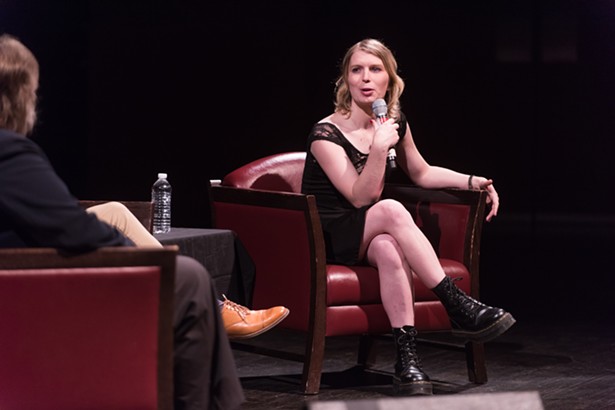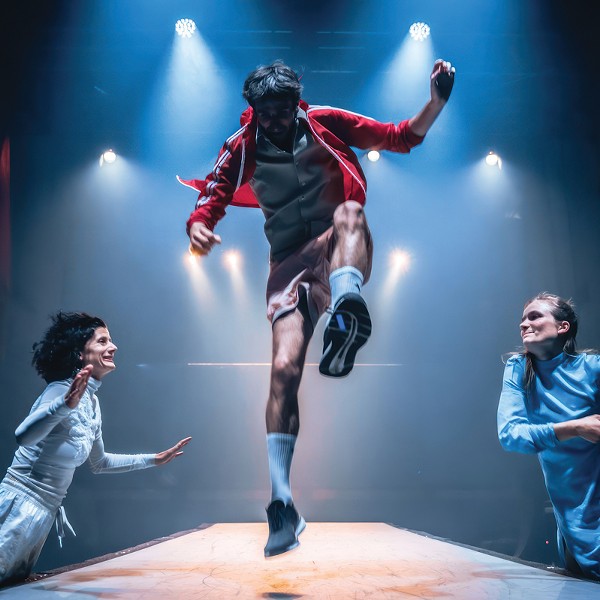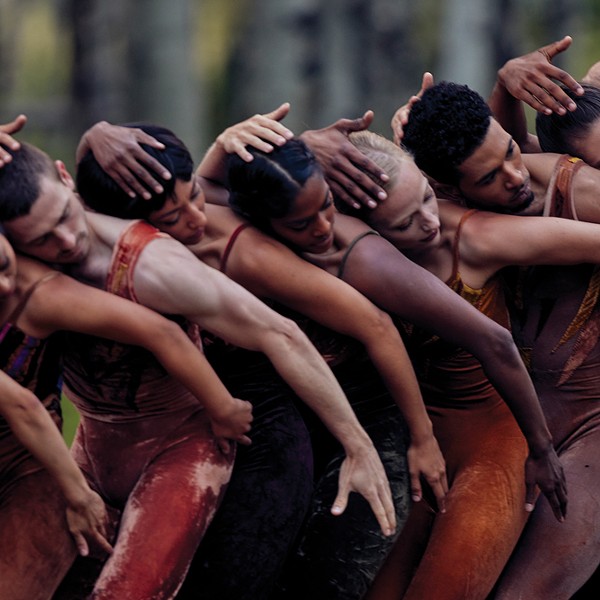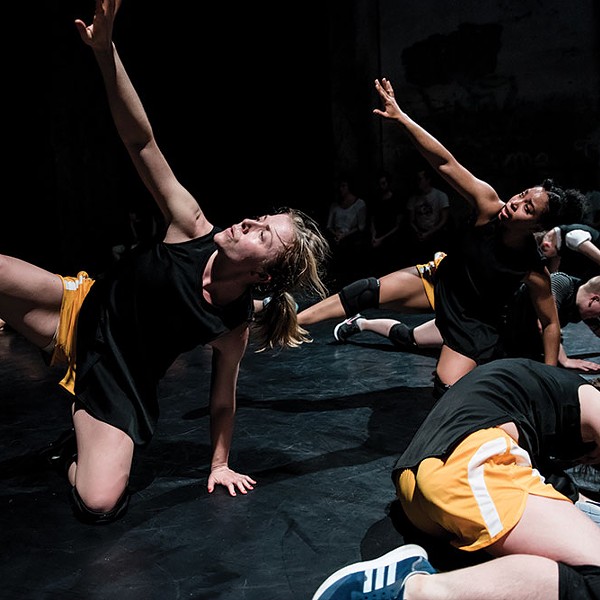Back in February, with a birds-eye view from the balcony at Bard College’s Fisher Center for the Performing Arts, I got a look at a world famous symbol for anti-government resistance and activism. Onstage, next to a professor and a dean, sat a pretty unassuming figure: a woman about 5’2” with medium length bleach blonde hair, decked out in black from head to toe, including a pair of large black combat boots. If I’d passed her on the street, I might’ve believed she was a small-time disruptor or activist–someone who likes to say “fuck the system” every once in a while. I would not peg her for an internationally renowned civil liberties activist and former convict who became one of President Obama’s most high-profile pardons.
Chelsea Manning first appeared in the collective national consciousness in 2010 as one component of a story much larger than herself: the emergence of Wikileaks. In May of that year it was revealed that Manning had leaked 750,000 US national security documents to Wikileaks, a website notorious for publishing classified and often damning governmental, political and corporate information. In 2013, after three years of detention, Manning was tried and convicted of espionage, and sentenced to 21 to 35 years in Fort Leavenworth Military Prison. Just three days before the end of his Presidency, Barack Obama commuted Manning’s sentence and she was released four months later. Since her release, Manning has been an outspoken activist for transgender rights, prison reform and the limitation of government surveillance and foreign intervention. In January 2018, she announced her candidacy for the US Senate from Maryland as a Democrat, challenging longtime incumbent Senator Ben Cardin. In February, she gave talks at both Bard and Vassar, unrelated to her Senate campaign, about government surveillance, and transgender rights and prison reform respectively.
Because of the sheer size of the stories in which she's been involved, it is easy to paint Manning as a symbol of something greater than herself–a monolith of anti-government activism and transgender advocacy. In left-wing progressive circles like those that dominate Vassar and Bard’s student body-politiques, Manning is seen as a fighter against the old-guard and the status quo that subjugates and illegalizes bodies which don’t conform to traditional sexual and gender roles. However, she’s also looked upon at least somewhat fondly in alt-right circles for her crusade against the globalist and statist powers which, they believe, seek to destroy America with endless war and foreign intervention. Manning, it seems, rejects these characterizations. Her speeches at Bard and Vassar suggest that as she mounts a campaign for Senate, she wishes to cease being placed into such simplistic paradigms and paint a complex picture of herself for all to gaze upon.
At Vassar, she was accompanied by CeCe McDonald for a talk called “No Prisons, No Wars: Setting a Trans Abolitionist Agenda.” McDonald, a black transgender woman who’d been housed in two mens prisons after being manslaughter (acting in self defense), is an outspoken and radical advocate for LGBT rights who isn’t afraid to say what she thinks. She was also interviewed by Vassar students–and the lecture was also mostly attended by students–who tend to be much more uncompromisingly progressive and idealistic than professors. During that interview, she took on a pragmatic persona.
Early on in that talk, she stated that she “became political” in response to ‘Prop 8,’ a 2008 California ballot initiative that banned gay marriage in the state. While this detail may seem an unimportant trifle, it actually serves as a telling prologue to the persona she would adopt for that event. While most trans-rights activists will probably tell you that it is the systematic discrimination and otherization they face on a daily basis that causes them to speak-out, Manning–who was openly gay by at least 2005 and has stated she knew she had been conflicted about her gender identity well before joining the army–was pushed by legislation.
Manning went on to paint herself, to my utter shock and that of my peers, as a pretty rational political actor, stating “there is some pragmatism in activism and engaging with the state,” and arguing that Hillary Clinton-esque incremental change is useful in activism as long as one doesn’t lose sight of the goal. She spoke about her attendance at an alt-right gathering hosted by notable alt-right personality and conspiracy theorist Mike Cernovich, clarifying that, while she viewed those individuals in the far-right and white nationalist movement as irredeemable, it’s important to acknowledge the agency and power of one’s opponent. This is radically moderate language, and not what I expected from someone like Manning. As I understand it, students were generally disappointed by Manning’s words and were expecting someone with the sassy flare and barn-burning idealism of her fellow speaker McDonald and, in many cases, themselves.
Bard was a different story altogether.
From that aforementioned balcony I saw the Manning I thought I knew evolve before my eyes from a rational political player into an uncompromising activist whose interests seemed so unaligned with the government, political elite, and status quo that her reasons for running for Senate became extremely vague. One particularly telling moment was when Bard’s Dean of College, one of the event’s moderators, pressed her on her precise reasons for leaking 750,000 military documents to Wikileaks, asking if there was a particular piece of information she wanted to expose. Manning couldn’t seem to conjure a satisfactory answer. Instead, she offered up generally anti-government platitudes like “the government doesn’t keep secrets because it has a rational reason,” and “everything is becoming a national security issue.” For Manning, it wasn’t about the content of the documents revealing corruption and human rights abuses, but rather the fact that the government was keeping secrets about them. Because of this secrecy, it wasn’t the content but simply the act of exposure that mattered to Manning.
For the rest of the event, she spoke about how people can protect their data from the government through encryption and even pushed back against gun control measures such as a government database of gun ownership–a very standard left-wing position–stating that “police militarization is a serious problem” and positing that the conversation about guns should focus on government and police weapons rather than individual ownership. She bent over backwards to go against the very system she is running to be a part of.
If Manning’s Senate run gains steam, as she presumably hopes it will, she will see media scrutiny of every aspect of her life and her policies like never before. Elections bring with them unparalleled public exposure in the form of media coverage and opposition research, and as we saw from Donald Trump and Hillary Clinton’s Presidential campaigns, even the most high-profile candidates usually have some hidden controversies. Therefore, it is worth asking if she has solidified a public persona that voters can take with them when they go to the polls. The voters of Maryland and all Americans should be asking themselves one question: who is Chelsea Manning? Honestly, your guess is as good as mine.
[{
"name": "Newsletter Mailchimp Signup - Inline Content",
"insertPoint": "3",
"component": "20934832",
"requiredCountToDisplay": "3",
"parentWrapperClass": ""
}]
Support Chronogram
Related Content
Website

















